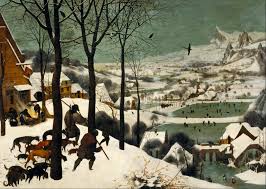 The first chapter of this novel was brilliant and won me over. A sophisticated city couple retreats to their country cottage in England, where they try to be friendly with the country-bumpkin neighbors who own an estate, and significantly, several old paintings they’d like to have evaluated.
The first chapter of this novel was brilliant and won me over. A sophisticated city couple retreats to their country cottage in England, where they try to be friendly with the country-bumpkin neighbors who own an estate, and significantly, several old paintings they’d like to have evaluated.
“The [dogs’] owner appears around the side of the cottage, … a real countryman… ‘Heel!’ he says, in an effortlessly landowning kind of voice and the dogs become instantly subservient.”
I love “an effortlessly landowning voice.” What a lot of social information is packed into that casual phrase. (Too bad about the extraneous two words that somewhat spoil it).
The city people hold their noses and try to make nice. They have expertise in art history, she in “iconography.” he in “iconology.” One of the humorous delights of the chapter is the explanation of that meaningless difference which they take very seriously.
“I sneak a quick look at the books on the shelves. There’s abundant leather-bound evidence of the voracious appetite possessed by earlier generations of Churts for genealogy and local curiosities. But by the time the leather bindings cease, literary intake seems to have declined, first to travel diaries and sporting memoirs, then to a few paperback thrillers and spy stories, then, in the last thirty or forty years, so far as I can see, to nothing at all.” (p. 19).
That is just terrific writing (alas, again spoiled by an additional sentence tacked onto the end, “Our new friend’s obviously not a literary man.”)
Unfortunately, carefully observed and expertly rendered social observation are fairly well-confined to the first chapter. After that, the story and the writing become tedious in the extreme. The writing is entirely objectivized, meaning full of workmanlike descriptions of persons, places, and things, with characters’ interior states simply declared without psychological justification.
I plodded on because I have a particular interest in art history, but soon I was ground down even by that. Did you know that Jan Breugel the Elder (painter of Hunters in the Snow) for a time signed his name Brueghel, until around 1560 when he dropped the “h.” But when he registered his sons’ births, he gave them the ‘h?’ Then, when his son, Breughel the Younger had his own son, he changed his name to Breughel the Elder, so there were two Elders, one with an ‘h’ and one without. No, you didn’t know that.
But who cares? There’s some point at which the minute details of any profession simply don’t make good reading for a general audience.
A rather transparent swindle story is laid over the relentless art-history but it’s entirely predictable and I never did care about it because the characters were all so manufactured. It’s as though Frayne did all this extremely detailed art-historical research and by gosh he wanted you to see every ounce of it. That’s usually a beginner’s error.
But what do I know? Booker Prize Finalist. The novel obviously appeals to others. I may becoming a curmudgeon.
Frayne, Michael (1999). Headlong. New York: Picador (344 pp.).
